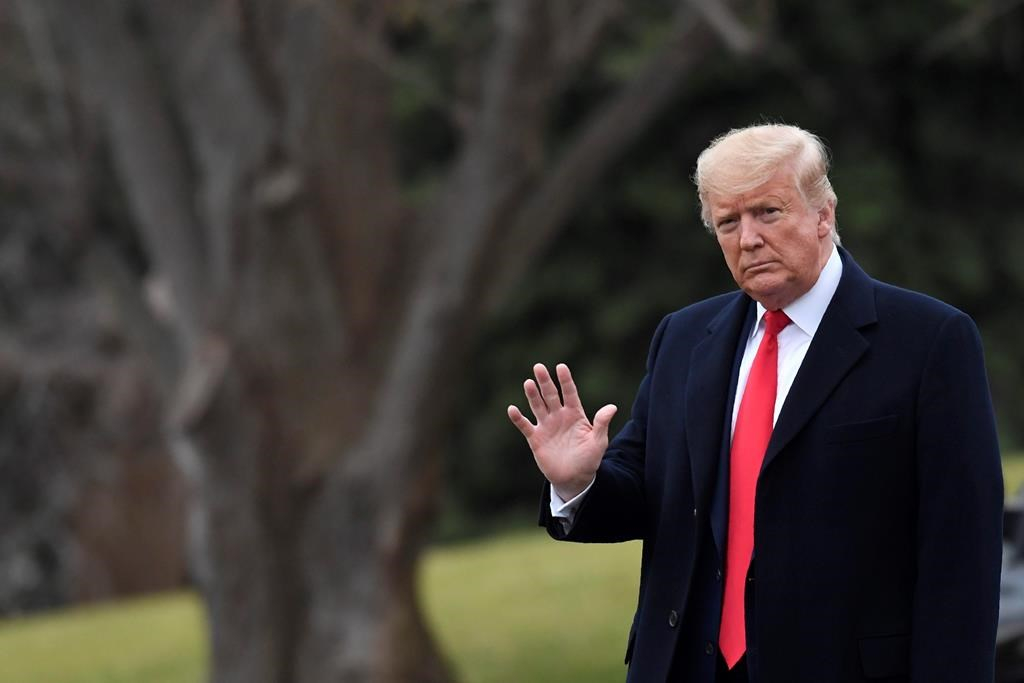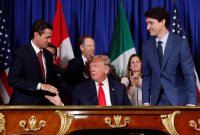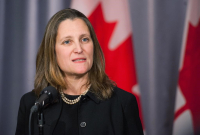Support strong Canadian climate journalism for 2025
President Donald Trump signed off Wednesday on the new road map for the U.S.-Mexico-Canada Agreement, clearing the way for the House of Commons to debate the merits of the next era of North American trade.
Trump signed the implementation bill, which cleared Congress two weeks ago, during a lengthy ceremony on the South Lawn of the White House that featured Vice-President Mike Pence, U.S. trade ambassador Robert Lighthizer and a lengthy roster of Republican lawmakers.
"This is something we really put our heart into — it's probably the number 1 reason I decided to lead this crazy life I'm leading right now, as opposed to that beautiful, simple life of luxury that I led before this happened," Trump said to laughter.
"I love doing it, and the reason I love doing it is that nobody in a period of three years has done so much, as all of us have — nobody."
Canada is now the only member of the trilateral deal that has yet to ratify the agreement, a process that's expected to begin later in the day as Deputy Prime Minister Chrystia Freeland, who presided over the negotiations as foreign affairs minister, introduces legislation in the House.
The USMCA — christened in Canada as CUSMA but known more widely simply as "the new NAFTA" — is expected to feature prominently in Trump's re-election efforts, which is why Democrats in the House of Representatives are also claiming credit for the latest version of the deal.
Rep. Rosa DeLauro, a House Democrat who was among a group that negotiated stringent new labour and environmental provisions for the deal, says Canada has yet to commit to a timeline for when its ratification process will be complete.
In Ottawa, Prime Minister Justin Trudeau promised prompt but careful, considered progress.
"Various industries, various groups have questions and concerns," Trudeau said.
"It's important we all work together in the House to move forward on this. There will be a certain amount of pressure on Canada from both Mexico and the United States, who want to see this move forward, but we have questions and we have a process for ratification. I just look forward to getting through it responsibly and rapidly, because it's so important to Canadians."
Even once Canada passes the needed legislation, it will still take several months before the new rules of the road are fully in place.
The agreement doesn't come into force until the first day of the third month after the final country — in this case, Canada — serves notice that it's ready to proceed. The mechanism is aimed at giving all three parties time to develop so-called "uniform regulations" used to interpret the terms of the deal.
Once that happens, a welcome measure of predictability, consistency and confidence will return to the continental trade corridor, said Kirsten Hillman, Canada's acting ambassador to the U.S., who was on hand for today's ceremony.
"Trade agreements as public policy tools do two things: they open markets and liberalize trade between parties so as to incentivize mutual benefits — supply chains, investment, business partnerships — and they create predictable rules that Canadians can count on in deciding to make business choices," Hillman said in an interview.
"One of the challenges over the past couple of years has been that this instrument that underlines and underpins a $2-billion-a-day trading relationship we have with the United States has been under negotiation, creating a certain sense of instability within our trading community."
There are still unknown variables, however, including the fact that the agreement commits Mexico to a suite of labour reforms described by some as the most comprehensive and sweeping ever imposed. They include:
— Eliminating all forms of compulsory labour;
— Protections to allow workers to organize, form and join the union of their choice, and to prevent employer interference in union activities;
— Allowing free and secret votes on union leadership and agreements;
— Setting up independent labour courts and arm's-length agencies to oversee union elections and arbitrate contract disputes.
"In my view, the labour reforms being undertaken in Mexico are the largest labour reforms ever undertaken in North America, including the New Deal in the U.S.," said Dan Ujczo, an international trade lawyer and U.S.-Canada expert with Dickinson Wright in Columbus, Ohio.
"It is a huge undertaking, and so every Canadian and U.S. company that has operations in Mexico had better get ready for a significant adjustment period on labour and employment issues in Mexico."
A Canadian delegation that's taking part in a working group is in Mexico this week to determine precisely what sort of help Canada can offer in getting the reforms implemented, Hillman said.
"I am not concerned. I'm not saying it's going to be easy, but I think these obligations are very much something that are very consistent with the policies and objectives of the Mexican government," she said.
"We are wanting to do what they feel is most helpful."
This report by The Canadian Press was first published Jan. 29, 2020.
—With files from Mike Blanchfield in Ottawa





Comments